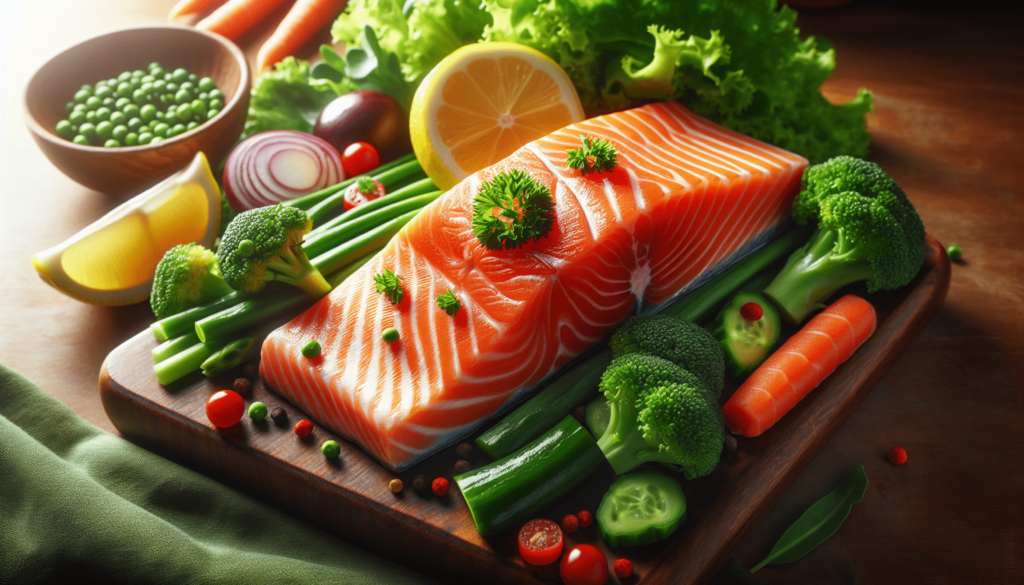Ever wonder why fish oil pills are battling for supremacy on your kitchen counter alongside your multivitamins and antacids? Prepare yourself for a deep-sea journey into the world of Omega-3 fatty acids—those slippery little ninjas that have been touted as the ultimate health elixir. Whether you’re a couch potato or a marathon runner, understanding the role of Omega-3 fatty acids in a healthy diet is like knowing when to use a semicolon; it’s essential but often overlooked.

What Are Omega-3 Fatty Acids? The VIPs of the Nutrient World
Think of Omega-3 fatty acids as the A-list celebrities of the nutrient world. They’re talked about, raved about, and, yes, sometimes even misunderstood. These polyunsaturated fats are essential for human health, which means your body can’t produce them. Like that one friend who always forgets their wallet at lunch, your body relies on you to supply them through your diet.
The Three Amigos: ALA, EPA, and DHA
When it comes to Omega-3s, three main types form the ultimate trifecta: ALA (Alpha-Linolenic Acid), EPA (Eicosapentaenoic Acid), and DHA (Docosahexaenoic Acid). It sounds like an alphabet soup on steroids, but each plays a unique role in your health.
| Omega-3 Type | Source | Health Benefits |
|---|---|---|
| ALA | Plant oils (flaxseed, soybean) | Cardiovascular health, anti-inflammatory properties |
| EPA | Marine oils (fish, algae) | Reduces inflammation, supports mental health |
| DHA | Fish, algae | Brain function, visual development, heart health |
How Do Omega-3s Work Their Magic? Science or Sorcery?
You might be thinking, “How do these fatty acids actually do their stuff?” Imagine your body is a well-oiled machine. Omega-3s are like the high-grade lubricant that keeps everything running smoothly, from the engines in your heart to the tiny cogs in your brain.
Reducing Inflammation: Firefighters in Your Body
Inflammation is your body’s way of saying, “Something’s wrong!” But chronic inflammation? That’s like the annoying neighbor who mows their lawn at 6 AM on Sunday. Omega-3s, particularly EPA, help reduce this chronic inflammation, potentially lowering the risk of various diseases like heart disease and arthritis.
Brain Food: Not Just for Zombies
DHA is the real brainiac here. It’s crucial for brain development and function, making up a significant portion of the grey matter in your noggin. According to studies, higher levels of DHA have been linked to improved cognitive performance and a lower risk of mental decline. So, if you’ve ever found yourself in a room and forgotten why you walked in, maybe it’s time to up your Omega-3 game.
Heart Health: The Cupid of Nutrients
Move over, chocolate; Omega-3s are the real heartthrobs. By reducing triglycerides and lowering blood pressure, these fatty acids give your heart the TLC it deserves. EPA and DHA, in particular, have been shown to reduce the risk of heart attacks and strokes.
| Health Benefit | Omega-3 Type | Mechanism |
|---|---|---|
| Reduced Inflammation | EPA | Lowers cytokine levels |
| Improved Brain Function | DHA | Enhances synaptic plasticity |
| Heart Health | EPA & DHA | Reduces triglycerides, blood pressure |

Sources of Omega-3: Fishy Business or Plant Paradise?
Alright, let’s get down to the feeding frenzy. Where can you find these Omega-3 fatty acids? It’s almost like a culinary treasure hunt.
Seafood Galore: The Ocean’s Gift
Fatty fish like salmon, mackerel, and sardines are like the gold mines of Omega-3s. They’re rich in EPA and DHA and can make a fabulous addition to your meal plan if you don’t mind the occasional fish burp.
Plant Power: Veggie Victory
For those who’d rather hug a fish than eat it, there’s good news. Plant-based sources like flaxseeds, chia seeds, and walnuts are excellent for getting your ALA fix. While ALA isn’t as potent as EPA or DHA, your body is pretty good at converting some of it into the other two.
Supplements: The Mercury-Free Option
If you’re not into fish or plants, there’s always the trusty supplement aisle. Fish oil capsules and algae-based supplements offer concentrated doses of Omega-3s without the hassle of meal prep.
| Source | Rich in | Best For |
|---|---|---|
| Fatty Fish | EPA, DHA | Non-vegans |
| Flaxseeds | ALA | Vegans, Vegetarians |
| Fish Oil Capsules | EPA, DHA | Anyone, especially those wary of mercury |
| Algae Oil Supplements | DHA | Strict vegetarians, vegans |
How Much Omega-3 Do You Need? The Million-Dollar Question
Getting the right amount of Omega-3s can be like trying to find the perfect balance of sweet and salty in a caramel popcorn recipe. According to health experts, the following are the generally recommended daily amounts:
- ALA: 1.1 to 1.6 grams
- EPA and DHA combined: 250 to 500 milligrams
But Wait, Are You Overdoing It?
Just like too much ice cream can lead to brain freeze, overdoing Omega-3s might also have some unwanted side effects. Consuming them in very high amounts can lead to blood thinning, so if you’re on medication for blood pressure or clotting, get that sorted with your doc.
Omega-3s: Myths vs. Facts
Now, let’s bust some myths like an episode of MythBusters, but without the risk of blowing up the garage.
Myth 1: Fish Oil Makes You Smell Fishy
Unless you’re dousing yourself in it like cologne, you’re probably safe. While some people do experience fishy burps, high-quality supplements are less likely to cause this.
Myth 2: Plant-Based Omega-3s Are Ineffective
While it’s true that ALA isn’t as potent as EPA or DHA, it doesn’t mean it’s ineffective. Your body does a decent job of converting ALA into the other forms, albeit not perfectly.
Myth 3: More Omega-3 Means More Benefits
As with dating, less is sometimes more. Stick to recommended dosages unless you’re into risking nosebleeds and other less glamorous side effects.
The Celebrity Endorsements: What Does Science Say?
Various studies and institutions have put their stamp of approval on Omega-3 fatty acids. The American Heart Association, World Health Organization, and numerous peer-reviewed journals have all praised the health benefits of regular Omega-3 intake.
The Meta-Analysis: The Oscars of Scientific Studies
If you’re the kind who thrives on scientific validation, meta-analyses—gigantic studies that review other studies—show that Omega-3s have a positive impact on cardiovascular health, cognitive function, and inflammation reduction.
How to Seamlessly Incorporate Omega-3s into Your Diet
You don’t need to be Julia Child to whip up an Omega-3-rich meal. Here are some easy, tasty ways to get those fatty acids into your daily diet without turning your kitchen into a war zone.
Breakfast: Smoothie Bowls
- Flaxseeds
- Chia seeds
- Walnuts
Blend them into a smoothie for a wholesome start to your day.
Lunch: Fish Tacos
- Salmon
- Mackerel
Top off with some avocado and whole grain tortillas.
Dinner: Stir-Fry
- Tofu or tempeh
- Walnuts
Add your favorite veggies and you’ve got a plant-based Omega-3 feast.
Snack Time: Nuts and Seeds
- Walnuts
- Pumpkin seeds
A handful can keep you going between meals and ensure you’re inching closer to your Omega-3 goals.
The Final Word: Love Your Fat
Remember, not all fats are enemies skulking around waiting to clog your arteries. Omega-3 fatty acids are the kind of fats you invite to your family BBQ: they mingle well, bring their own beer, and leave everything a little better than they found it. By incorporating these fatty acids into your diet, you’re not just adding another health fad to your list—you’re welcoming a time-tested, science-backed, bona fide superstar into your life.
So next time you contemplate skipping the fish in favor of another sad salad, remember that your body is basically begging for a little Omega-3 love. Who knows, you might just find yourself not only healthier but more prepared to answer the trivia question at your local pub’s Friday night quiz.
Get those Omega-3s in your diet, and let the good times (and good health) roll!
